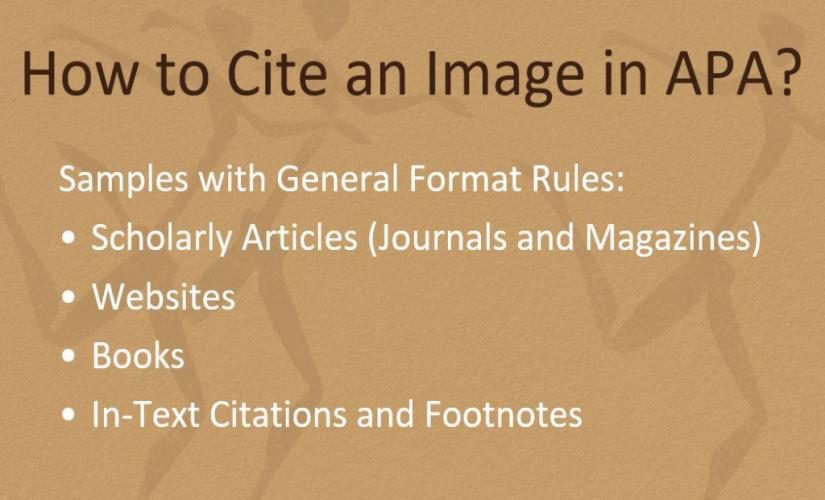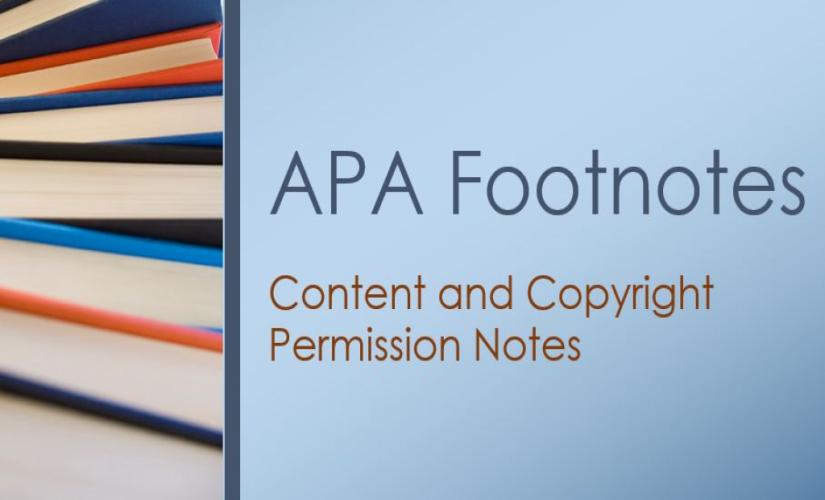Images taken from other sources and included in one’s work need to be cited appropriately to avoid plagiarism. Moreover, an in-text citation and a source entry in the reference page for an image are required. In turn, an image citation depends on a type of source. Possible sources include magazines, journals, websites, books, and others. Also, a footnote format applies specific rules when creating a citation for an image. Hence, students need to learn how to cite an image in APA to follow academic integrity. Additionally, they may encounter situations where they need to understand how to cite a court case in APA, which requires similar attention to detail.

1. APA Image Citation for a Scholarly Article
When citing images from journal articles, one starts with a label of the image followed by the words “adapted from,” and, then, there is the title of the article. After the title, one includes the names of the authors, year of publication, the title of the journal, the number of a volume, issue number, and the page number. As a result, such a citation ends with the copyright year by copyright holder’s name.
How to Cite an Image from a Scholarly Source in APA:
General Format for Scholarly Sources, including Magazine and Journal Articles:
Figure X. Image description or image title. Adapted from “Title of Source,” by Author’s First Initial. Author’s Second Initial. Author’s Surname, year, day, (for a magazine) or just a year (for a journal), Magazine Title or Journal Title, the number of a volume (issue number), page or pages. Copyright Year by Copyright Holder’s Name.
Note: This format is applied to all types of illustrations, like charts, graphs, tables, maps, and visuals. In the case of a library database, this format is also applied, but some parts may be skipped if they are not provided.
In-Text Citation Sample of an Image for a Journal Article or a Magazine Article in APA:

Figure 1: Trade balances (US$ billion) from 1995 to 2016. Adapted from “Globalisation at a critical conjuncture,” by R. Martin, P. Tyler, M. Storper, E. Evenhuis, and A. Glassmeier, 2018, Cambridge Journal of Regions, Economy and Society, 11(1), p. 6. Copyright 2018 by the Cambridge Political Economy Society.
Reference Entry Example of an Image for a Journal Article or a Magazine Article in APA:
Martin, R., Tyler, P., Storper, M., Evenhuis, E., & Glasmeier, A. (2018). Globalisation at a critical conjuncture. Cambridge Journal of Regions, Economy and Society, 11(1), 3–16. https://doi.org/10.1093/cjres/rsy002
2. Citing a Picture from a Website in APA
For images taken from a website, one starts with a label of an image. Then, the words “Adapted from” are followed by the title of a website. After that, the name of the author, publication date, the title of the website, date of retrieval, and a URL of the image. The example below illustrates an APA citation.
How to Cite a Picture in APA Taken from a Website
General Format for a Website:
Figure X. Image description or image title. Adapted from “Title of a web page,“ by Author’s First Initial. Author’s Second Initial. Author’s Surname, date of publication, Website Title. Retrieved Month and day, year (it is a date when you accessed it last time), from url link. Copyright date by Copyright Holder’s Name.
In-Text Citation Example of an Image for a Journal or Magazine Article in APA:

Figure 2. A black bull. Adapted from “Don’t be a bull in the headlights as central banks stop propping up stock markets,“ by T. H. Kee, 2018, MarketWatch. Retrieved from June 21, 2020, from https://www.marketwatch.com/story/dont-be-a-bull-in-the-headlights-as-central-banks-stop-propping-up-stock-markets-2018-06-14.
Reference Entry Sample of an Image for a Journal Article or a Magazine Article in APA:
Kee, T. H. (2018, June 14). Don’t be a bull in the headlights as central banks stop propping up stock markets. MarketWatch. https://www.marketwatch.com/story/dont-be-a-bull-in-the-headlights-as-central-banks-stop-propping-up-stock-markets-2018-06-14. Copyright 2020 by MarketWatch, Inc.
3. APA Citing Rules for an Image Taken from a Book
When citing an image from a book, a citation format is simple since it requires less information. Basically, a citation entry for an image starts with a description of a photo image and, then, ends with information about a book.
How to Cite an Image from a Book in APA
General Format for a book:
Figure X. Image description or image title. Adapted from “Title of Source,” by Author’s First Initial. Author’s Second Initial. Author’s Surname, year, Publisher, page or pages. Copyright Year by Copyright Holder’s Name.
In-Text Citation Example of an Image for a Book in APA:

Figure 1. An image of a first Page. Adapted from “Globalization: culture and education in the new millennium,“ by M.M. Suárez-Orozco and D. B. Qin-Hilliard, 2016, Rawat Publications, p. 1. Copyright 2016 by the Regents of the University of California.
Reference Entry Sample of an Image for a Book in APA:
Suárez-Orozco, M. M., & Qin-Hilliard, D. B. (2016). Globalization: culture and education in the new millennium. Rawat Publications.
4. Using an Image in APA as a Footnote
When using a footnote format, a label of an image and description starts, and, then, a superscript number corresponds to reference entry in the footnote section.

Footnote In-Text Citation Sample of an Image in APA:
Figure 3. A black bull.1
Footnote Entry Example of an Image in APA:
Adapted from “Don’t be a bull in the headlights as central banks stop propping up stock markets,“ by T. H. Kee, 2018, MarketWatch. Retrieved from June 21, 2020, from https://www.marketwatch.com/story/dont-be-a-bull-in-the-headlights-as-central-banks-stop-propping-up-stock-markets-2018-06-14.


